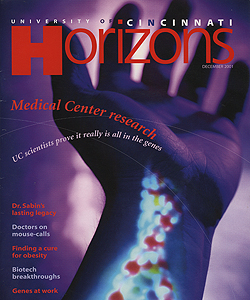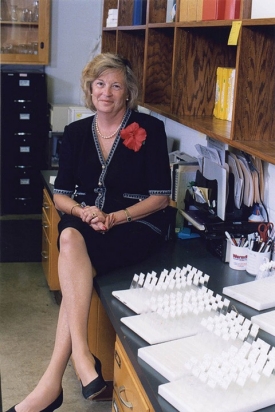by John Bach
The statistics are alarming. The death rate for cancer in the Cincinnati metropolitan area ranks among the top 10th percentile in the country. The fact that area cemeteries are full of its victims is evidence enough we are losing the local battle against cancer. But it gets worse.
Patients are leaving town for care. Cincinnatians are leaving town for hope. They leave their homes, their families, their friends, their churches behind to seek new treatments, to seek second opinions and to put off death. And not just at the Mayo Clinic. Cancer victims are turning to regional doctors and hospitals as close as Lexington, Ky.; Pittsburgh, Pa.; and even Columbus, Ohio.
"There is the perception that cancer care is not what it should be in the Cincinnati area," says Cecilia Fenoglio-Preiser, director of the University of Cincinnati Department of Pathology and Laboratory Medicine and newly appointed director of the Barrett Cancer Center. "We have scattered excellence, but we need more uniform excellence. For much of cancer treatment, you can get reasonable care within the general community. But there is the perception, particularly for a person who is incurable, that we don’t have access to state of the art clinical trials and we are not as cutting edge."
That, she says, will change. Not just the perception, but also the reality. If admitting a problem is the first step, it is time to move to step two. Fenoglio-Preiser, an internationally known expert on genetic alterations in tissue, says plainly, "Cancer is not a success story in this institution."
The good news is it can be. In fact, she expects UC to attain the high distinction as a National Cancer Institute within the next five years.
UC's Millennium Research Plan calls for doubling funded research for the university by 2006 to focus particularly on four areas. Cancer research made the short list. "We have basic scientists studying what makes a cell become a cancer cell," says John Hutton, dean of the college of medicine. "We are placing an emphasis on developing a stronger arm in translational research, taking the basic science and translating it into direct patient care delivery."
The goal for cancer research at UC and the Barrett Center is to create a first-rate integrated clinical cancer program that provides quality care and guarantees patients are treated promptly and with compassion.
The vision is to build a unique cancer research program that capitalizes on and expands upon existing strengths. And UC's strength lies squarely with its genetic research.
"We have to begin to take advantage of the human genome project and analyze individual tumors in individual patients," says Fenoglio-Preiser. "It isn't enough to analyze 500 patients with breast cancer. You have to figure out what is different in each patient.
"The first step in creating any cancer cure is to understand what is abnormal about the cells. You have to develop a genomics approach to cancer."

 Past Issues
Past Issues
